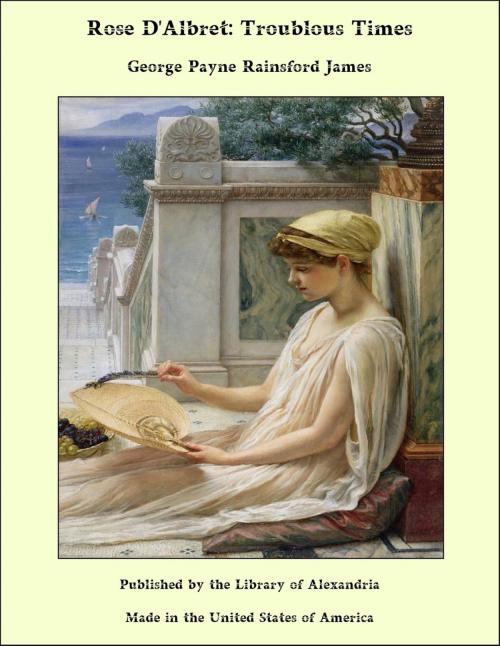Rose D'Albret: Troublous Times
Nonfiction, Religion & Spirituality, New Age, History, Fiction & Literature| Author: | George Payne Rainsford James | ISBN: | 9781465607379 |
| Publisher: | Library of Alexandria | Publication: | March 8, 2015 |
| Imprint: | Language: | English |
| Author: | George Payne Rainsford James |
| ISBN: | 9781465607379 |
| Publisher: | Library of Alexandria |
| Publication: | March 8, 2015 |
| Imprint: | |
| Language: | English |
Whatever effect the institution of chivalry might have upon the manners and customs of the people of Europe; however much it might mitigate the rudeness of the middle ages, and soften the character of nations just emerging from barbarism, there was one point which it left untouched by its softening influence, and which remained, till within a few years of the present period, as a case of great hardship upon those who are supposed to have benefited more particularly by the rise of chivalrous feeling. Women, to whose defence the knights of old devoted their swords: women, for whose honour and renown so many a gallant champion has shed his blood: women, for whose love so many wars have been kindled and so many deeds done, were, till within a short period of the present day, mere slaves in those matters where their own happiness was concerned. Their influence, it is true, might be great over the heart and mind, but in person, at least till after their marriage, they were simply bonds-women; they ruled without power even over themselves, and had no authority whatsoever in those transactions which were of the most importance to them. Where parents were living--although even then it was thought scarcely necessary to consult a young woman upon the disposal of her own hand,--yet we may suppose that parental affection might occasionally enable her to exercise some influence, however small, in the acceptance or rejection of a lover. But where the parents were dead, she had for many centuries, especially in France, no voice whatever in the matter, and was consigned, often against her inclination, to the arms of one whom perhaps she had never seen, whom she often regarded with indifference, and often with hate. It is little to be wondered at that such a state of things produced gross immorality. The first act of a young woman's life, the act alone by which she obtained comparative freedom, being one by which all the fine and delicate sensibilities, planted by God in the female heart, were violated at once,--it is little to be wondered at, I say, that the vows by which men endeavoured to supply the place of principles, should be violated likewise at the voice of inclination. The fault, however, was in the feudal system; and the manner in which lands were first acquired in Europe, produced regulations for their transmission which generated the greatest social evils,--from the consequences of which indeed we are not yet altogether free. Each feoff was required to be held by a man who could do service to his sovereign in the field; and, consequently, when any vassal or vavasor died, leaving behind him one or more daughters, the law required that the feoff should be managed by a guardian till such time as, by marriage, the heiress or heiresses could present men to do homage for their lands, and perform military service to the superior lord. Thus, an heiress could not marry without her lord's approbation; and by the constitutions of St. Louis it was enacted, that, even where a daughter was left under the care of her mother, the lord might require security that she should not form an alliance without his consent; and the good king, in the rule which he lays down for the choice of a husband for a ward, directs the guardian simply, if there be two or three who offer, to take the richest.
Whatever effect the institution of chivalry might have upon the manners and customs of the people of Europe; however much it might mitigate the rudeness of the middle ages, and soften the character of nations just emerging from barbarism, there was one point which it left untouched by its softening influence, and which remained, till within a few years of the present period, as a case of great hardship upon those who are supposed to have benefited more particularly by the rise of chivalrous feeling. Women, to whose defence the knights of old devoted their swords: women, for whose honour and renown so many a gallant champion has shed his blood: women, for whose love so many wars have been kindled and so many deeds done, were, till within a short period of the present day, mere slaves in those matters where their own happiness was concerned. Their influence, it is true, might be great over the heart and mind, but in person, at least till after their marriage, they were simply bonds-women; they ruled without power even over themselves, and had no authority whatsoever in those transactions which were of the most importance to them. Where parents were living--although even then it was thought scarcely necessary to consult a young woman upon the disposal of her own hand,--yet we may suppose that parental affection might occasionally enable her to exercise some influence, however small, in the acceptance or rejection of a lover. But where the parents were dead, she had for many centuries, especially in France, no voice whatever in the matter, and was consigned, often against her inclination, to the arms of one whom perhaps she had never seen, whom she often regarded with indifference, and often with hate. It is little to be wondered at that such a state of things produced gross immorality. The first act of a young woman's life, the act alone by which she obtained comparative freedom, being one by which all the fine and delicate sensibilities, planted by God in the female heart, were violated at once,--it is little to be wondered at, I say, that the vows by which men endeavoured to supply the place of principles, should be violated likewise at the voice of inclination. The fault, however, was in the feudal system; and the manner in which lands were first acquired in Europe, produced regulations for their transmission which generated the greatest social evils,--from the consequences of which indeed we are not yet altogether free. Each feoff was required to be held by a man who could do service to his sovereign in the field; and, consequently, when any vassal or vavasor died, leaving behind him one or more daughters, the law required that the feoff should be managed by a guardian till such time as, by marriage, the heiress or heiresses could present men to do homage for their lands, and perform military service to the superior lord. Thus, an heiress could not marry without her lord's approbation; and by the constitutions of St. Louis it was enacted, that, even where a daughter was left under the care of her mother, the lord might require security that she should not form an alliance without his consent; and the good king, in the rule which he lays down for the choice of a husband for a ward, directs the guardian simply, if there be two or three who offer, to take the richest.















